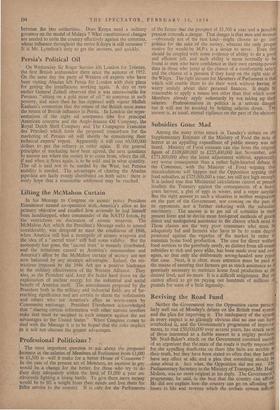Subsidies Gone Mad
Among the many notes struck in Tuesday's debate on the Supplementary Estimate of the Ministry of Food the note of horror at an appalling expenditure of public money was not heard. Ministry of Food estimate can rise from the original figure of £109,600,000 to £235,400,000 last November, and £271,800,000 after the latest adjustment without, apparently, any worse consequence than a rather' light-hearted debate in the Commons, with the Minister of Food 'arguing that miscalculations will happen and the Opposition arguing that food subsidies, at £325,000,000 a year, arc still not high enough, It is indeed true that Ministerial calculations cannot at present insulate the Treasury against the consequences of a heavy grain harvest, a glut of eggs in winter, and a sugar surplus,' But the right answer to such a situation is neither resignation on the part of the Government, nor crowing on the part of, its opponents, nor a further tinkering with the subsidies machinery. The answer is to get rid of subsidies in their present form and to devise more fool-proof methods of giving direct and undisguised assistance to the classes which need it, Those classes are the very poor consumers who must he adequately fed and farmers who have to be to some degree protected against the vagaries of the market in order to maintain home food production. The case for direct welfare food services to the genuinely needy, as distinct from all-round subsidies to rich and poor alike, has been made over and over again, so that only the deliberately wrong-headed now reject that case. Next; it is clear, more attention must be paid to the means of ensuring that farmers get as much assistance as is genuinely necessary to maintain home food production at the, desired level, and no more. It is a difficult assignment. But vver cannot afford to go on paying out hundreds of millions pounds for want of a little ingenuity.


































 Previous page
Previous page